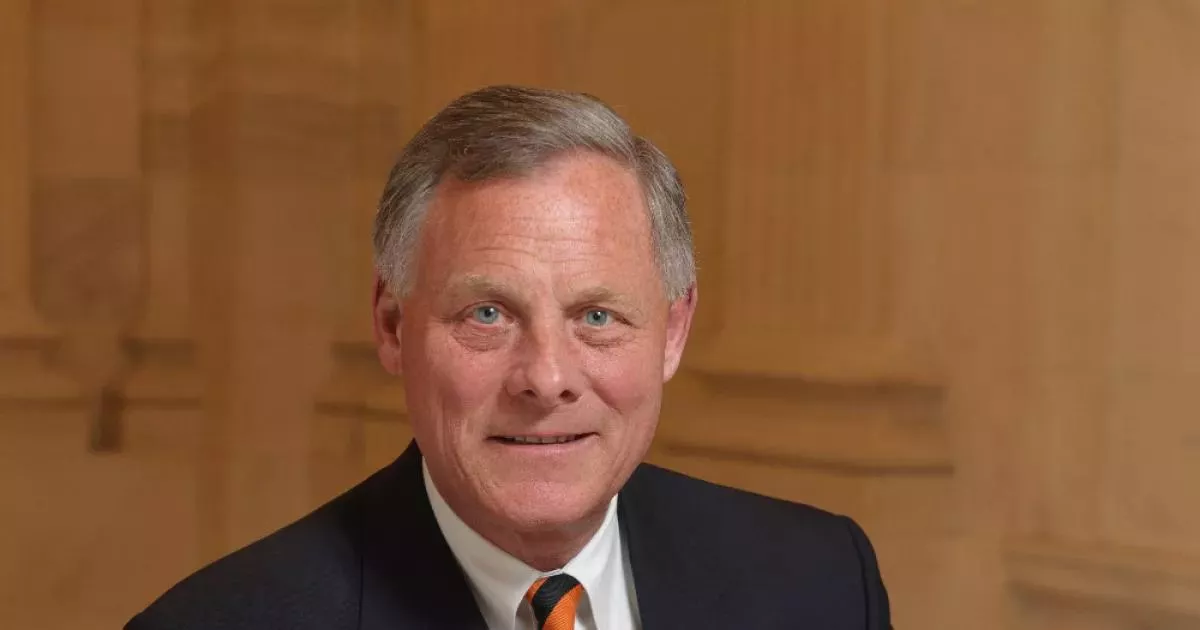Richard Mauze Burr is a former US Senator (2005-2023) from North Carolina. A Republican, he also served in the US House of Representatives. During his Senate tenure, he was actively involved in intelligence matters, notably serving as chairman of the Senate Intelligence Committee. Burr faced scrutiny for stock trades made in early 2020, during the onset of the COVID-19 pandemic, but investigations were eventually closed without charges. He chose not to seek re-election in 2022 and retired from the Senate in 2023.
November 30, 1955: Birth of Richard Burr
Richard Burr was born on November 30, 1955, in Charlottesville, Virginia.
1965: Land and Water Conservation Fund Established
The Land and Water Conservation Fund was established in 1965.
1968: Sam Ervin's Reelection
Sam Ervin was reelected to the U.S. Senate from North Carolina in 1968.
1973: Burr's Volkswagen Thing
In 1973, Burr owned a 1973 Volkswagen Thing, which was known on Capitol Hill. He also has an aversion to reporters.
1974: High School Graduation
Richard Burr graduated from Richard J. Reynolds High School in 1974.
1978: College Graduation
Richard Burr graduated from Wake Forest University in 1978 with a B.A. in communications.
1984: Marriage to Brooke Fauth Burr
Richard Burr married Brooke Fauth Burr in 1984. They have two sons. He is also a distant relative of Aaron Burr.
1992: First Run for Congress
Richard Burr first ran for a seat in the U.S. House of Representatives in 1992 but lost.
1992: Schumer Amendment to Energy Policy Act
The original Schumer Amendment to the Energy Policy Act of 1992 placed increased controls on U.S. civilian exports of weapons-grade highly enriched uranium.
1994: Elected to the U.S. House of Representatives
In 1994, Richard Burr was elected to the U.S. House of Representatives for North Carolina's 5th congressional district.
1997: Authors FDA Modernization Act
In 1997, while serving in the House, Richard Burr authored the FDA Modernization Act.
2001: Vote for No Child Left Behind Act
Burr voted for the No Child Left Behind Act in 2001.
2002: Vote for Iraq War Resolution
In 2002, Burr voted in favor of the Authorization for Use of Military Force Against Iraq Resolution.
2002: Runs Unopposed for Reelection
Richard Burr ran unopposed for reelection to the House in 2002.
2003: Co-sponsors Amendment to Energy Policy Act
In 2003, Richard Burr co-sponsored an amendment to the Energy Policy Act relaxing restrictions on the export of enriched uranium.
July 2004: Wins Republican Primary for U.S. Senate
Richard Burr won the Republican primary for the U.S. Senate in July 2004.
2004: First Elected to the U.S. Senate
Richard Burr was first elected to the U.S. Senate in 2004.
January 4, 2005: Sworn in to the Senate
Richard Burr was sworn in to the U.S. Senate on January 4, 2005.
2005: Senate Career Begins
Richard Burr began his service as a U.S. Senator for North Carolina in 2005.
January 2007: Support for Troop Surge in Iraq
In January 2007, Burr supported President Bush's troop surge in Iraq.
2007: Runs for Chair of Senate Republican Conference and Named Deputy Whip
In 2007, Burr ran for chair of the Senate Republican Conference but lost. He was named a deputy whip the same year.
2007: Beginning of Financial Crisis
The 2007-2008 financial crisis began.
2008: Concerns about Financial System Collapse
During the 2007-2008 financial crisis, Burr expressed concerns about the financial system collapsing.
December 2009: Vote Against Affordable Care Act
Burr voted against the Patient Protection and Affordable Care Act (ACA) in December 2009.
2009: Opposition to FDA Tobacco Regulation
In 2009, Burr opposed legislation granting the FDA authority to regulate the tobacco industry.
2009: Reiterates Concerns about Financial System
In 2009, Burr reiterated his concerns about the stability of the financial system.
2009: Votes Against Omnibus Public Land Management Act
Richard Burr voted against the Omnibus Public Land Management Act of 2009.
2009: Appointed Chief Deputy Whip
Senator Jon Kyl appointed Richard Burr Chief Deputy Whip in 2009.
2010: Introduction of National Uniformity for Food Act
In 2010, Burr introduced the National Uniformity for Food Act, aiming to restrict states from mandating product labels beyond FDA requirements.
2010: Vote Against Health Care and Education Reconciliation Act
In 2010, Burr voted against the Health Care and Education Reconciliation Act.
2010: Vote for Don't Ask, Don't Tell Repeal Act
In 2010, Burr voted for the Don't Ask, Don't Tell Repeal Act.
2010: Opposes Dodd-Frank Act
Richard Burr strongly opposed and voted against the Dodd-Frank Wall Street Reform and Consumer Protection Act of 2010.
2010: End of the "Curse"
Richard Burr's 2010 reelection marked the first time North Carolina reelected a senator to the same seat since 1968.
2011: Vote to Abolish the EPA
In 2011, Burr voted to abolish the Environmental Protection Agency (EPA) and merge it with the U.S. Department of Energy.
2011: Seeks Post of Minority Whip
Richard Burr announced his intention to seek the post of minority whip in 2011.
2012: Opposition to STOCK Act
Burr was one of three senators to oppose the STOCK Act of 2012, which aimed to prevent insider trading by members of Congress.
2012: Co-Sponsorship of Medicare Overhaul Plan
In 2012, Burr co-sponsored a plan to overhaul Medicare, proposing to raise the eligibility age and shift more seniors to private insurance.
2012: Drops Out of Minority Whip Race
Richard Burr dropped out of the race for minority whip in 2012.
2013: Vote Against Carbon Emissions Tax
In 2013, Burr voted against a federal tax or fee on carbon emissions, reflecting his opposition to measures aimed at mitigating climate change.
2013: Vote Against Gun Control Measures
In 2013, Burr voted against various gun control measures, including expanded background checks and an assault weapons ban.
2013: Criticizes Ted Cruz and Filibuster
In 2013, Richard Burr criticized Senator Ted Cruz and other Republicans for filibustering the federal budget.
2013: Burr's stance on same-sex marriage and LGBT rights
In 2013, Richard Burr supported a constitutional ban on same-sex marriage but also stated that the decision should be left to individual states. He voted against the Employment Non-Discrimination Act, which aimed to protect LGBT individuals from employment discrimination.
2013: Vote on Violence Against Women Act
Richard Burr voted to reauthorize the Violence Against Women Act in 2013.
2014: Co-Sponsorship of ACA Replacement Bill
In 2014, Burr co-sponsored the Patient Choice, Affordability, Responsibility and Empowerment Act, a bill aiming to repeal and replace the ACA.
2014: Federal Government Shutdown
The filibustering of the fiscal year 2014 federal budget led to a government shutdown.
March 2015: Votes for Paid Sick Time Amendment
Richard Burr voted in favor of an amendment to allow employees to earn paid sick time in March 2015.
May 2015: Proposed Patriot Act extension
In May 2015, as chair of the Senate Intelligence Committee, Burr proposed a five-year extension of the Patriot Act. He initially supported reauthorization without reforms but later softened his stance due to House opposition.
June 2015: Support for NSA data collection
In June 2015, Burr advocated for the NSA's continued bulk collection of telephone metadata, but Congress ultimately passed the USA Freedom Act, which modified the data collection process.
2015: Vote Against Climate Change Acknowledgement
In 2015, Burr voted against a measure acknowledging the reality of climate change and the significant contribution of human activity to it.
2015: Support for same-sex spouse benefits
In 2015, Burr voted in favor of granting federal Social Security and veterans' benefits to same-sex spouses.
2015: Becomes Chair of Senate Intelligence Committee
Richard Burr chaired the Senate Intelligence Committee from 2015 to 2020.
July 20, 2016: Announces He Will Not Seek a Fourth Term
On July 20, 2016, while campaigning, Richard Burr announced his decision not to seek a fourth Senate term in 2022.
2016: Russian interference in the 2016 election
Burr led the Senate investigation into Russian interference in the 2016 United States elections.
2016: Stance on Ukrainian interference
During Trump's first impeachment trial, Burr stated his intention to oppose Trump's removal even if a quid pro quo was confirmed and also opposed calling John Bolton as a witness
2016: Proposed "backdoor" mandate for encryption
Following the FBI-Apple encryption dispute in 2016, Burr and Senator Dianne Feinstein circulated a draft bill that would require tech companies to provide law enforcement with user data in an "intelligible format" when ordered by a court.
2016: Opposition to Increased Federal Education Funding
In 2016, Burr expressed opposition to increasing funding for federal education projects, including Pell Grants and student loan refinancing.
2016: Opposition to judicial nominations
In 2016, Burr opposed holding a nomination hearing for Merrick Garland, President Obama's Supreme Court nominee, and blocked the nomination of Patricia Timmons-Goodson to the U.S. District Court.
2016: Stance on future Supreme Court nominations
In 2016, Burr stated his intention to block any Supreme Court nominations made by Hillary Clinton if she were to win the presidency.
2016: Campaign Contributions from DeVos Family
In 2016, Burr's reelection campaign received donations from the DeVos family.
2016: Announces Decision Not to Seek Reelection
In 2016, Richard Burr announced that he would not seek reelection in 2022.
2016: NRA Endorsement and Support
In 2016, the NRA endorsed Burr for reelection and provided extensive financial support to his campaign.
2016: Advisor to Donald Trump's Presidential Campaign
Richard Burr served as an advisor for Donald Trump's 2016 presidential campaign.
2016: Supports Privatization of Social Security
Richard Burr supported the privatization of Social Security in 2016.
March 2017: Briefing on Russian interference investigation
In March 2017, Comey briefed Burr, as chair of the Senate Intelligence Committee, and other congressional leaders on the investigation into Russian interference in the 2016 election.
2017: Co-Sponsorship of Israel Anti-Boycott Act
In 2017, Burr co-sponsored the Israel Anti-Boycott Act.
2017: Response to Comey's firing
In 2017, Burr praised James Comey as a "public servant of the highest order" after Trump fired him as FBI Director.
2017: Vote for ACA Repeal Legislation
In 2017, Burr voted for the Republican legislation to repeal and replace major parts of the ACA.
2017: Confirmation Vote for Betsy DeVos
In 2017, Burr voted to confirm Betsy DeVos as U.S. Secretary of Education.
2017: Vote to Repeal Environmental Regulations
In 2017, Burr voted to repeal the Stream Protection Rule and regulations on energy companies regarding waste, emissions, and foreign payments.
December 2018: Vote on First Step Act
In December 2018, Burr initially voted against the cloture motion on the First Step Act, a criminal justice reform bill, but ultimately voted for the law itself.
2018: Opposition to Restrictions on Arms Sales to Saudi Arabia and UAE
In 2018 and 2019, Burr opposed legislation restricting arms sales to Saudi Arabia and the United Arab Emirates.
2018: Support for Abortion Restrictions
In 2018, Burr voted in favor of legislation banning abortion after 20 weeks and supported various other measures restricting abortion access.
2018: Votes for Partial Repeal of Dodd-Frank
In 2018, Richard Burr voted for legislation that partially repealed the Dodd-Frank reforms.
February 2019: Vote Against Troop Withdrawal from Afghanistan and Syria
In February 2019, Burr voted against withdrawing U.S. troops from Afghanistan and Syria.
December 2019: Impeachment inquiry and Ukraine meddling theory
In December 2019, during Trump's impeachment inquiry, Burr promoted the theory of Ukrainian interference in the 2016 election.
2019: Founding of the Roosevelt Conservation Caucus
In 2019, Burr co-founded the Roosevelt Conservation Caucus, advocating for market-based solutions to environmental issues.
2019: Opposition to Ending Military Assistance in Yemen
In 2019, Burr opposed ending U.S. military assistance to the Saudi-led intervention in Yemen.
2019: Vote to Repeal EPA Emission Rule
In 2019, Burr voted in favor of repealing an Environmental Protection Agency (EPA) rule concerning emissions.
February 2020: Stock sales before COVID-19 market crash
In February 2020, Burr sold over $1.6 million in stocks before the COVID-19 market crash, while receiving daily briefings on potential health threats. His brother-in-law, Gerald Fauth, also sold stocks after a phone conversation with Burr.
February 2020: Vote Against Restricting Military Action Against Iran
In February 2020, Burr voted against a measure to restrict President Trump from taking military action against Iran without congressional approval.
May 15, 2020: Steps Down as Chair of Senate Intelligence Committee
On May 15, 2020, Richard Burr temporarily stepped down as chair of the Senate Intelligence Committee due to an FBI investigation.
January 2021: Voting Record Analysis
As of January 2021, analysis showed that Richard Burr's votes aligned with President Trump's positions approximately 89% of the time.
January 19, 2021: FBI Investigation Closed
The Department of Justice closed its investigation into Richard Burr on January 19, 2021, without filing charges.
February 9, 2021: Vote on Trump's second impeachment trial
On February 9, 2021, Burr voted against the constitutionality of Trump's second impeachment trial.
May 28, 2021: Abstention on January 6 commission vote
On May 28, 2021, Burr abstained from voting on the creation of an independent commission to investigate the January 6 Capitol attack.
September 2022: Unsealing of FBI search warrant affidavit
In September 2022, the FBI search warrant affidavit related to Burr's stock sales was partially unsealed following litigation.
December 14, 2022: Farewell Address
Richard Burr delivered his farewell address to the Senate on December 14, 2022.
2022: Support for Respect for Marriage Act
In 2022, Burr voted in support of the Respect for Marriage Act.
2022: Support for Bipartisan Gun Control Agreement
In 2022, Burr was one of ten Republican senators to support a bipartisan gun control agreement.
2022: Does Not Seek Reelection
Richard Burr did not seek reelection to the U.S. Senate in 2022.
January 3, 2023: Final Term Expires
Richard Burr's final Senate term expired on January 3, 2023.
2023: Senate Career Ends
Richard Burr's service as a U.S. Senator concluded in 2023.
August 13, 2024: Planned vote for Trump
On August 13, 2024, Burr stated his intention to vote for Trump in the upcoming presidential election.
Mentioned in this timeline

Donald John Trump is an American politician media personality and...
Ukraine is a country in Eastern Europe the second-largest on...

Hillary Diane Rodham Clinton is a prominent American politician lawyer...
The Affordable Care Act ACA also known as Obamacare is...
Saudi Arabia officially the Kingdom of Saudi Arabia KSA is...

John Bolton is an American attorney diplomat and Republican consultant...
Trending

40 minutes ago Dennis Quaid expresses admiration for Donald Trump, discusses political climate in United States.

40 minutes ago Hillary Clinton Addresses Ghislaine Maxwell's Presence at Chelsea's Wedding Amidst Controversy.

41 minutes ago Luciano Darderi Achieves Santiago QF; Predictions for Navone vs Kopriva Match

2 hours ago Toriano Pride Jr. shines at NFL Combine, impressing Vikings potential draft pick.

2 hours ago Rapinoe Reacts to Trump Invite Criticism Amidst Hockey Team's Political Debate.

2 hours ago Townsend vs. Masarova: WTA Austin Quarterfinal Prediction and Masarova's Quarterfinal Entry
Popular

Jesse Jackson is an American civil rights activist politician and...

Susan Rice is an American diplomat and public official prominent...

XXXTentacion born Jahseh Dwayne Ricardo Onfroy was a controversial yet...

Michael Joseph Jackson the King of Pop was a highly...

Barack Obama the th U S President - was the...

Hillary Diane Rodham Clinton is a prominent American politician lawyer...
